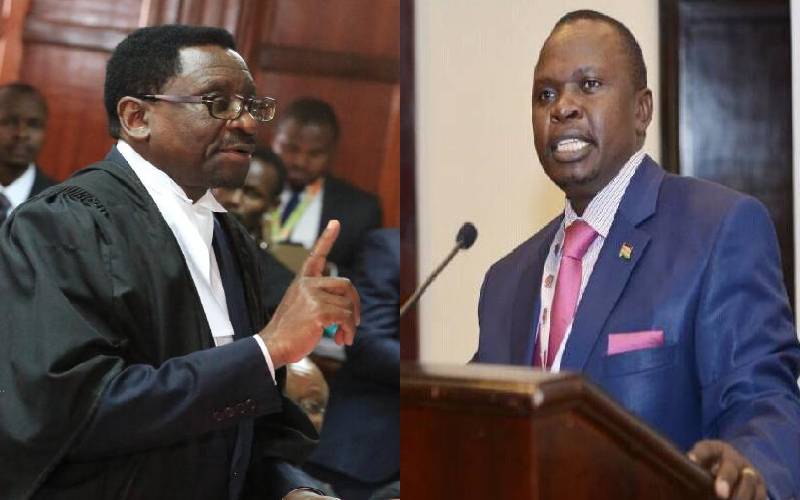
Senior Counsel James Orengo and Laywer James Mwamu
Chief Justice David Maraga’s recommendations to President Uhuru Kenyatta to dissolve Parliament for failing to enact the two-thirds gender rule has drawn mixed reactions from legal and constitutional experts.
Whereas a section of lawyers are of the opinion that Uhuru has no option but to act on the CJ’s recommendation, others argue that the Constitution does not give a timeline for the president to act on the recommendation.
Article 261 (7) provides that if Parliament fails to enact a law in accordance with an order directing it to take steps to ensure that the required legislation is enacted, the Chief Justice shall advise the president to dissolve Parliament and the President shall dissolve Parliament.
It is the silence on the time within which the president is supposed to act on the CJ’s recommendations that experts believe will make it impossible for Uhuru to dissolve Parliament.
Siaya Senator and constitutional lawyer James Orengo tweeted in support of the CJ’s decision but raised his concerns on how it will be implemented.
“CJ Maraga’s advice to the president to dissolve Parliament is momentous, probably the most significant and historic from a constitutional standpoint. How we apply foundational principles and values of the rule of law and constitutionalism is now the big test,” he said.
Senate Majority Chief Whip Irungu Kangata said since the Constitution does not define a time frame on implementing the CJ’s recommendation, the president would still be complying with the advisory if he dissolves the House in June 2022.
Lawyer Donald Kipkorir claimed in a tweet that the advisory is a love letter to BBI supporters.
“The primeval instinct of MPs is self-preservation. All MPs will gang up and amend the Constitution to remove the gender rule.”
Return letter
Kipkorir advised Uhuru to return the letter to Maraga.
“Call it bluff & RTS (return to sender) the letter to him after you have written across it: “Ku-an-na” as your father would have. 2. Dissolve Parliament and call parliamentary elections as your father did in 1966.”
He added: “Ignore the letter and let activists file a Constitutional Reference, which by the time it reaches Supreme Court it will be 2025! CJ Maraga is retiring this year. This status will allow you to rule by fiat. A fluid legal situation favours an incumbent.”
The lawyer claimed future courts would not dare void Executive actions.
“The law abhors a vacuum. Therefore, any of the choices above you make are and will be legitimate. Enjoy your evening, Your Excellency.”
But Law Society of Kenya, Nairobi branch chairman Eric Theuri argued that the president is constitutionally bound to dissolve Parliament and there are no two ways about it.
According to Theuri, members of the National Assembly and Senate are to blame for the current situation, having been given enough time to pass the legislation on the two-thirds gender principle, but have willingly delayed in enacting the law.
“The Constitution contemplated that the gender principle would be enacted within five years after promulgation, but Parliament has delayed even after the deadline was extended for them by the Supreme Court,” said Theuri.
Lawyer Sam Muga agreed that the president has no option since the CJ acted within his powers to invoke Article 261, which states that the CJ shall advise the president to dissolve Parliament if they fail to pass legislation.
Former East Africa Law Society President James Mwamu, however, said the president has no obligation to comply with Maraga’s recommendations.
“The president and Parliament still have a choice. They can go to court and seek an interpretation on whether the CJ was legally right to make the pronouncement. And given the trend of disobeying court orders, the president can choose to disregard the recommendation,” said Mwamu.
Lawyer Henry Kurauka said the Constitution is silent on the timeline in which the president can act on the recommendations, which is likely to make him ignore the advice.
He, however, added that the recommendation has given the president ammunition against MPs since he can use it as a threat to whip them into toeing the government line.
“The MPs are now under the mercy of the president who can decide to send them home any time. Justice Maraga has given President Uhuru a perfect tool to whip MPs to support his agenda and since he is not an elected MP, he will have nothing to lose by dissolving Parliament,” said Kurauka.
Political interest
The lawyers, however, agreed that the CJ’s timing might not work in the political interests of the country if the president were to dissolve Parliament, which would throw the country further into election mode.
“With the current situation in the country, the president might use his wisdom not to dissolve Parliament. The Constitution does not say the president must act on the advice within a given time so he can use that to save the country from early campaigns,” said Muga.
Theuri added that the country must first assess if the electoral commission is prepared for another election and since the term of Parliament is fixed at five years, there are likely to be challenges if the House is dissolved.
Credit: Source link